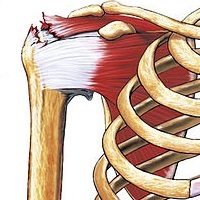
Photo from wikipedia
Background: Clinically significant outcomes (CSOs) connect patient-reported outcome measures data to patient-perceived benefit. Although investigators have established threshold values for various CSOs, the timeline to achieve these outcomes after isolated… Click to show full abstract
Background: Clinically significant outcomes (CSOs) connect patient-reported outcome measures data to patient-perceived benefit. Although investigators have established threshold values for various CSOs, the timeline to achieve these outcomes after isolated biceps tenodesis (BT) has yet to be defined. Purpose: To define the time-dependent nature of minimal clinically important difference (MCID), substantial clinical benefit (SCB), and Patient Acceptable Symptom State (PASS) achievement after isolated BT. Study Design: Case series; Level of evidence, 4. Methods: The American Shoulder and Elbow Surgeons score (ASES), the Single Assessment Numeric Evaluation, and the Constant-Murley score (CMS) were administered preoperatively and at 6 and 12 months postoperatively to patients undergoing isolated BT between 2014 and 2018 at our institution. Cumulative probabilities for achieving MCID, SCB, and PASS were calculated using Kaplan-Meier survival analysis. Weibull parametric regression evaluated the hazard ratios (HRs) of achieving earlier MCID, SCB, and PASS. Results: Overall cohort (N = 190) achievement rates ranged between 77.8% and 83.2% for MCID, between 42.2% and 80.2% for SCB, and between 59.7% and 62.9% for PASS. Median achievement time was 5.3 to 6.1 months for MCID, 5.9 to 6.4 months for SCB, and 6.07 to 6.1 months for PASS. Multivariate Weibull parametric regression identified older age, male sex, higher body mass index, preoperative thyroid disease, smoking history, and higher preoperative CMS as predictors of delayed CSO achievement (HR, 1.01-6.41), whereas normal tendon on arthroscopy, defined as absence of tenosynovitis or tendon tear on arthroscopy, predicted earlier CSO achievement (HR, 0.19-0.46). Location of tenodesis and worker compensation status did not significantly predict the time to achieve CSOs on multivariate analysis. Conclusion: After isolated BT, patients can expect to attain CSO by 13 months postoperatively, with most patients achieving this between 5 and 8 months. Patients tend to take longer to achieve PASS than MCID and SCB.
Journal Title: Orthopaedic Journal of Sports Medicine
Year Published: 2022
Link to full text (if available)
Share on Social Media: Sign Up to like & get
recommendations!